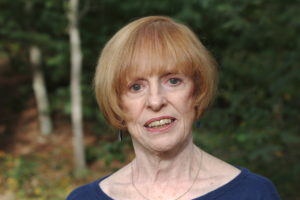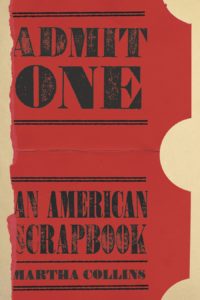Admit One: An American Scrapbook (Pittsburgh, 2016)
Synopsis: Using a wide variety of documentary resources and innovative poetic techniques, Admit One traces the history of scientific racism from the 1904 St. Louis World’s Fair through the eugenics movement of the 1920s.
What do you think makes your book (or any book) a “project book”?
Although the individual poems have titles, I’m inclined to think of Admit One as something like a book-length poem. Like chapters in a novel or memoir, almost all the poems depend on the context of the book itself, or at least a section of the book, for meaning and significance; a few may stand alone, but even those derive their impact from the context of the whole—narratively, thematically, emotionally.
Why this subject (or constraint)?
The short answer: obsession. The long answer relates to two previous books. I think of Admit One as (loosely) the third book in a trilogy that began with Blue Front (2008), a book defined, on the cover itself, as “a poem.” I didn’t intend to write a book-length poem when I began to think about and research a lynching my father had witnessed as a child; but once I began to write, I realized that only a book could contain all I had to say. The primary victim of the lynching was, predictably, an African American man, and I soon found myself thinking more broadly about race; that led to White Papers (2012), a more loosely structured book that focuses on what it has meant and means to be white in a racialized and still racist culture. That, I thought, would be it; but after a reading in which I read from those two books, Ilya Kaminsky suggested that I might be writing a trilogy. At the time I had no idea what that might mean, but sometime later I started thinking about the St. Louis World’s Fair. See below for how that led to the obsession that became Admit One.
Are you comfortable with the term “project book”?
I don’t know that the term “project book” even existed when I wrote Blue Front; I had certainly never heard it, and don’t think I would have used it if I had. White Papers and Admit One are not exactly “book-length poems” (the poems in White Papers stand alone but they don’t have titles; those in Admit One have titles but for the most part don’t stand alone). But I didn’t think of them as “project books” while I was writing them. I guess I’m not quite comfortable with the term, which suggests something conscious and deliberate, maybe even academic or corporate, whereas the process of writing these books has for me has been organic: I had little idea where I was going when I began.
Was your project defined before you started writing? To what degree did it develop organically as you added poems?
I’d been aware for many years that my grandparents had attended the 1904 St. Louis World’s Fair. Then I discovered that the Fair featured not only fake marble palaces extolling the virtues of civilization and progress, but also 3,000 human “exhibits”: people brought from all over the world to show, scientifically, the contrast between civilized and primitive peoples. Having no idea where this would lead, and not yet thinking of a book-length poem (despite the nudge to think of a trilogy), I became obsessed with the Fair and began simultaneously researching and writing about it. In the process, I discovered that one of the human “exhibits” had ended up two years later as an “exhibit” in the Bronx Zoo, and realized that the second section of the book (following “Fair”) would be called “Zoo.” Then I discovered that the founder of the Bronx Zoo, Madison Grant, had in 1916 published a book called The Passing of the Great Race, which, like its author, became central to the scientific racism that became the eugenics movement. I still didn’t have a plan, but at least I knew I was writing a book. It took me some time and a lot of research to settle on focusing the third and fourth sections on the years 1916 (the year of Grant’s book) and 1924 (the year the eugenics movement influenced important anti-immigration, anti-miscegenation, and involuntary sterilization legislation). I had no rules while I was writing—although some decisions about focus (e.g. which eugenicists to mention) and some technical strategies developed as the writing progressed, which gave me momentum.
How important was it for you that each poem could “stand on its own” or that the poems should rely on other poems in the book, or on the premise of the project itself, to succeed? What challenges did this present for you when writing single poems or structuring the book overall?
I knew, from the experience of writing the book-length poem Blue Front, that it was pointless to think about writing “stand alone” poems for this book; on the other hand, it would have been equally pointless to assume that poems ought to rely on other poems. Again, the process was organic. This meant that I was not able to think much about publishing individual poems along the way. In both Blue Front and Admit One, there are a number of lyric interludes which focus on individual words that are relevant to the surrounding material (e.g., hang, shoot, burn, and race, fit, pass). These poems can stand alone, to some extent, and a number of them appeared individually in print; but even they lose impact out of context.
At any point did you feel you were including (or were tempted to include) weaker poems in service of the project’s overall needs? This is a risk, and a common critique, of many project books. How did you deal with this?
Because documentation is such an important element in this book, I allowed important documentary facts—inherently “weak” as poetic material—to bear the same weight as a striking image or striking phrase might. Occasionally I let quoted material stand alone: italics are much in use in all three of these books. But selecting documentary details and putting them in the kind of condensed and musical form that I expect all poetry to have was a great but welcome challenge. I had begun translating Vietnamese poetry shortly before I embarked on these three books, and realized at some point that what I was doing in transforming the documentary material was related to what I had done in translating poems.
Did you fully immerse yourself in writing this project book, or did you allow yourself to work on other things?
I immersed myself fully in this book, with one exception, which was in fact another “project.” To go back again: when I finished Blue Front, I found it difficult to think about short poems—much as a short-story writer turned novelist may find it hard to go back to stories. And so I decided, at the beginning of October 2004, that I would write seven lines each day of the month, leaving me with a 31-section poem when I finished. In December 2005 I decided to do the same thing again—and simultaneously determined to continue this project (yes, this was a project) until I had written through all twelve months, in no particular order, at the rate of one per year; this meant that I would finish in 2015, as I indeed did. The first six of these poems were published as Day Unto Day in 2014; the second six will appear as Night Unto Night in 2018. When I embarked on this project, I didn’t realize I was going to be writing White Papers or Admit One. But I was committed, so for one month each year, I took a break from my other work and focused on the daily writing of these poems.
What advice can you offer other writers, particularly emerging writers or poetry students who may be using the project book as a guiding principle for their own work?
My first advice: be sure you love what you’re doing—even if, or perhaps particularly if, your subject is an uncomfortable one: you’re going to have to live with whatever it is (whether thematic or formal) for a long time. A better word than love may be the one I’ve been using: you really need to be obsessed. Don’t choose a subject or strategy arbitrarily, just because nobody has explored your territory before; be sure there’s some personal connection. On practice: If your project involves research, don’t plan to do all your research before you write. Writing with incomplete knowledge put me in the kind of uncertain place I am when I write more personal poems—the Keatsian negative capability. My last piece of advice will be difficult for emerging writers, and it won’t be necessary if your project is a series of stand-alone poems. But if your poems are connected, I’d suggest not trying to publish them until you’re finished, or at least rather far along, since the poems or sections are apt to be changed and enriched as you go.



